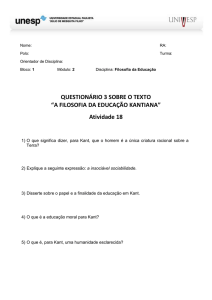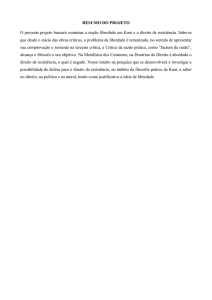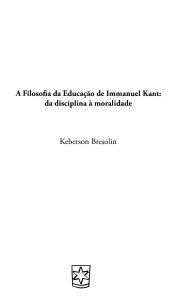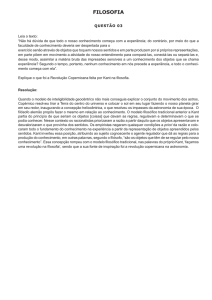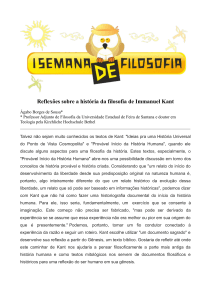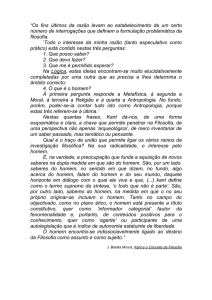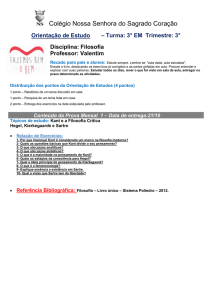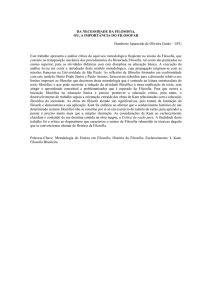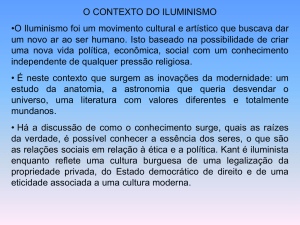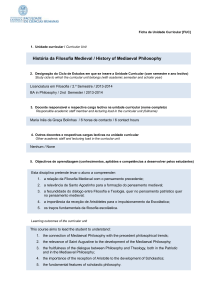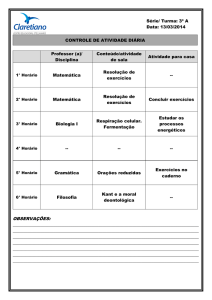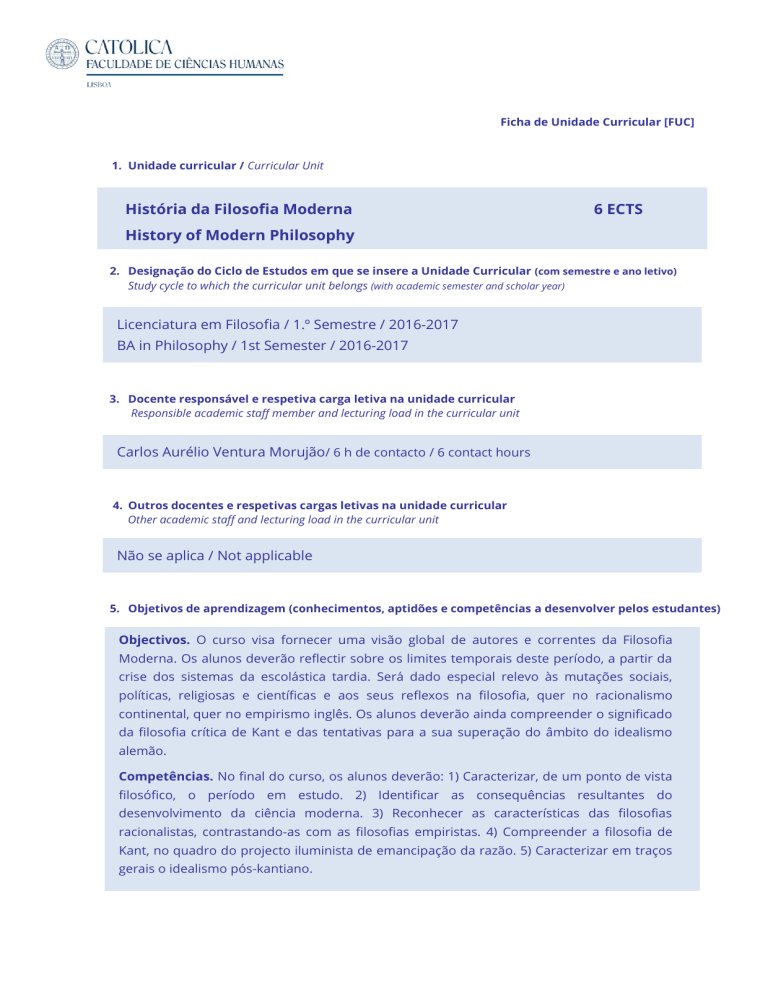
Ficha de Unidade Curricular [FUC]
1. Unidade curricular / Curricular Unit
História da Filosofia Moderna
6 ECTS
History of Modern Philosophy
2. Designação do Ciclo de Estudos em que se insere a Unidade Curricular (com semestre e ano letivo)
Study cycle to which the curricular unit belongs (with academic semester and scholar year)
Licenciatura em Filosofia / 1.º Semestre / 2016-2017
BA in Philosophy / 1st Semester / 2016-2017
3. Docente responsável e respetiva carga letiva na unidade curricular
Responsible academic staff member and lecturing load in the curricular unit
Carlos Aurélio Ventura Morujão/ 6 h de contacto / 6 contact hours
4. Outros docentes e respetivas cargas letivas na unidade curricular
Other academic staff and lecturing load in the curricular unit
Não se aplica / Not applicable
5. Objetivos de aprendizagem (conhecimentos, aptidões e competências a desenvolver pelos estudantes)
Objectivos. O curso visa fornecer uma visão global de autores e correntes da Filosofia
Moderna. Os alunos deverão reflectir sobre os limites temporais deste período, a partir da
crise dos sistemas da escolástica tardia. Será dado especial relevo às mutações sociais,
políticas, religiosas e científicas e aos seus reflexos na filosofia, quer no racionalismo
continental, quer no empirismo inglês. Os alunos deverão ainda compreender o significado
da filosofia crítica de Kant e das tentativas para a sua superação do âmbito do idealismo
alemão.
Competências. No final do curso, os alunos deverão: 1) Caracterizar, de um ponto de vista
filosófico, o período em estudo. 2) Identificar as consequências resultantes do
desenvolvimento da ciência moderna. 3) Reconhecer as características das filosofias
racionalistas, contrastando-as com as filosofias empiristas. 4) Compreender a filosofia de
Kant, no quadro do projecto iluminista de emancipação da razão. 5) Caracterizar em traços
gerais o idealismo pós-kantiano.
Learning outcomes of the curricular unit
Objectives. The purpose of this unit is to convey to students a survey of the main authors
and currents of Modern Philosophy. Students reflect about the temporal limits of the period,
starting with the crises of late scholastic systems. Particular importance is given to the social,
political, religious and scientific transformations at the beginning of modernity and their
impact on the philosophical systems, both of continental rationalism and British empiricism.
Students should also understand the meaning of the emergence in Kant’s critical philosophy
and the essays to overcome it in the systems of German Idealism.
Competencies. At the end of the semester, the students should: 1) Characterize, from a
philosophical point of view, the period of Modern Philosophy. 2) Identify the epistemological
and ontological consequences of the emergence of modern science. 3) Distinguish between
the main characteristics of continental rationalism and British empiricism. 4) Understand the
scope of the Kantian «revolution in the way of thinking» in the field of the emancipation of
reason enlightenment project. 5) Provide a general characterization of post-Kantian Idealism.
6. Conteúdos programáticos
1. Características gerais da idade moderna. As filosofias do renascimento. A crise da
escolástica. Platonismo e aristotelismo nos séculos XV e XVI. A nova visão do mundo e do
homem. O problema do infinito: Nicolau de Cusa e Giordano Bruno.
2. Descartes e o cartesianismo. A visão mecanicista do mundo. Física e metafísica. O cogito
cartesiano. O desenvolvimento do racionalismo e a transformação do conceito de
substância.
3. O cartesianismo no século XVII: Espinosa, Leibniz e Malebranche. O poder de Deus e a
liberdade do homem.
4. O problema do conhecimento no empirismo inglês: a crítica do racionalismo em Locke,
Berkeley e Hume.
5. O espaço, o tempo e o infinito, na ciência e na filosofia dos séculos XVII e XVIII. Os
Principia Mathematica de Newton.
6. O «século das luzes». A tolerância. O iluminismo francês, inglês e alemão.
7. Kant e o projecto de uma «crítica da razão». A «revolução no modo de pensar» e a
viragem coperniciana. Kant e a Revolução Francesa.
8. O «salto» para lá de Kant: Fichte, Schelling e Hegel. O Saber Absoluto como projecto do
idealismo alemão.
Syllabus
1. General characteristics of the Modern Age. The Philosophies of Renaissance. The crisis of
scholasticism. Platonism and Aristotelianism in 15th and 16th centuries. A new vision of
the world and of man. The problem of the infinite: Nicolas of Cues and Gordano Bruno.
2. Descartes and Cartesianism. The mechanist world-view. Physics and Metaphysics.
Descartes’ cogito. The development of rationalism and the transformation of the concept
of substance.
3. Cartesianism in the 17th century: Spinoza, Leibniz and Malebranche. The power of God
and the freedom of man.
4. The problem of knowledge in British empiricism: the critique of rationalism in Locke,
Berkeley and Hume.
5. Space, time and infinity in the science and philosophy of 17th and 18th centuries.
Newton’s Principia Mathematica.
6. The Enlightenment. The ideal of tolerance. French, British and German enlightenment.
7. Kant and the project of a «critic of reason». The «revolution in the way of thinking» and
the Copernican turn. Kant and the French Revolution.
8. Going beyond Kant: Fichte, Schelling and Hegel. Absolute knowledge as a project of
German Idealism.
7. Metodologia de ensino (avaliação incluída)
Ensino: O curso realizar-se-á em regime b-learning; o aluno terá uma aula mensal presencial
e pelo menos três aulas mensais em regime on-line. Serão explorados os seguintes Recursos
e Atividades da plataforma de ensino: páginas de lição, páginas de texto, glossário, fórum e
wiki. No início do curso, será fornecido aos alunos um cronograma da disciplina, com a
calendarização das atividades.
Avaliação: A avaliação consistirá numa prova escrita final, que valerá 50 % da classificação;
por um trabalho on-line (modelo: envio de ficheiro avançado), que valerá 30 % da
classificação final, e por atividades a realizar na plataforma, às quais caberão 15 % da
classificação final. Os restantes 5 % serão atribuídos à participação nas aulas presenciais.
Qualquer evidência de plágio será punida com a atribuição de zero ao elemento de avaliação
que tenha utilizado indevidamente textos de terceiros.
Teaching methodologies (including evaluation)
Teaching: The unit runs according to a b-learning regime: students attend one classroom
session and at least three online lessons each month. The following teaching platform
resources and activities are explored: lesson pages, text pages, glossaries, forums and wiki.
At the beginning of the unit, a schedule of activities is distributed to students.
Evaluation: The evaluation consists of a class-room written text at the end of the semester
(50 % of the total of the final classification) and several activities on the teaching platform
(one online paper: 30% of the final classification; other platform activities: 15%). The
remaining 5% is awarded for oral participation in the classroom sessions.
Any evidence of plagiarism is a disciplinary offense and will result in a penalty. A mark of zero
(0) will be awarded for the assignment.
8. Bibliografia principal
Main bibliography
ALQUIE, Ferdinand, La Découverte Métaphysique de l’Homme chez Descartes, Paris,
PUF, 1950.
BELAVAL, Yvon, Leibniz. Initiation à sa Philosophie, Paris, Vrin, 1993.
BOURGEOIS, Bernard, L’Idéalisme Allemand, Paris, Vrin, 2000.
CASSIRER, Ernst, Das Erkenntnisproblem in der Philosophie und Wissenschaft der
neueren Zeit, Berlin, Verlag Bruno Cassirer, 1906, 1907, 1920 (3 Bde).
--------, Die Philosophie der Aufklärung, Tübingen, J. C. B. Mohr, 1932 ; trad. franc., La
Philosophie des Lumières, Paris, Fayard, 1966.
DELBOS, Victor, Le Spinozisme, Paris, Vrin, 1968.
--------, De Kant aux Post-kantiens, Paris, Aubier, 1940.
DELEUZE, Gilles, Spinoza et le Problème de l’Expression, Paris, Éditions de Minuit,
1968.
HEIMSOETH, Heiz, Los Seis Grandes Temas de la Metafísica Occidental, trad. cast. de
José Gaos, Madrid, Revista de Occidente, 1974.
KOYRÉ, Alexandre, From the Close World to the Infinite Universe, Baltimore, The
Johns Hoppkins University, 1982.; tradução port., Do Mundo Fechado ao Universo
Infinito, Lisboa, Gradiva, 2006.
MARECHAL, Joseph, Le Point de Départ de la Métaphysique, Paris, Desclé de
Brouwer, 1943, 5 vols., vols. 2.º e 3.º.
PHILONENKO, Alexis, L’Oeuvre de Kant, Paris, Vrin, 1969-72, 2 vols.
WOOLHOUSE, R. S., Descartes, Spinoza, Leibniz. The Concept of Substance in
Seventeenth Century Metaphysics, London and New York, Routledge, 1993.

